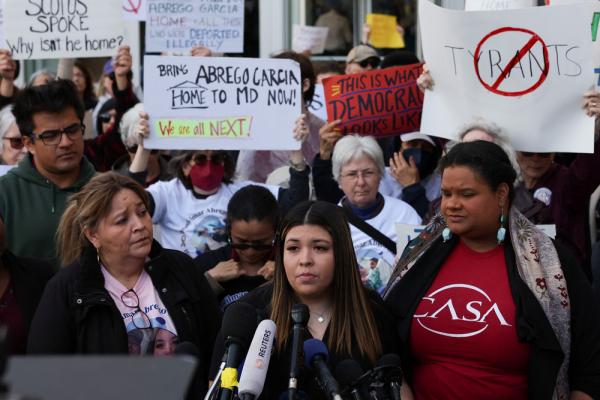At some point this Easter Weekend, Christians will be reflecting on the final words that Jesus spoke from the cross, sometimes referred to as the seven last words of Jesus.
When I was younger, I was convinced that System of a Down’s “Chop Suey!” was a Christian song because lead vocalist and lyricist Serj Tankian incorporated Jesus’ final declarations into the song. But dissimilar to the order that Christians have typically arranged Jesus’ final words, the song first quotes the cry of reunion and then climaxes with the cry of dereliction.
Considering that the Roman Empire believed Jesus was a terrorist and crucified him as one, emphasizing the cry of dereliction seems apt. As provocative as you might think it is to write that “Jesus was a terrorist,” I’m not the first person to suggest that this is exactly how the Roman Empire thought of him. There is, of course, the song “Jesus Was A Terrorist” by Jello Biafra and Nomeansno. But more seriously, biblical scholar Bart D. Ehrman argues that it is a historical fact that the Roman governor of Judea Pontius Pilate crucified Jesus of Nazareth on charges of fomenting an insurrection against the state. Ehrman explains in How Jesus Became God that Rome crucified Jesus because the empire believed he was a political insurgent.
Jesus was a first-century peasant Jew who lived under military occupation in the land of Palestine, and Rome labeled him a terrorist for reasons that parallel the United States’ recent efforts to label noncitizens as terrorists. The state labels people terrorists to quell dissent and intimidate people into self-policing for fear of receiving that label. Whether it’s green-card holders, those on student visas exercising their First Amendment rights by criticizing U.S. foreign policy, or immigrants generally, people from these groups are increasingly being labeled as terrorists or enemies of the United States.
I’m not drawing this parallel to proselytize anyone. Nor am I suggesting that people currently being labeled as terrorists due to their legal status or political views must be elevated to some divine ideal to garner sympathy or solidarity. I’m drawing this parallel because this Holy Week, the only thing I care to reflect on is how the label terrorist is deployed by empires to dehumanize and criminalize people.
Rome charged Jesus with sedition, crucifying him because he challenged the empire’s authority. To say that Jesus was a king would’ve been interpreted by the Roman authorities to be a direct challenge to their occupation of Palestine and an invitation to rebellion. Directly challenging occupation, inciting rebellion against the empire — nonviolently or otherwise — always brings swift retribution. Take for example the case of student activist Mahmoud Khalil.
On March 8, Khalil, who was a spokesperson for Columbia University students’ Gaza Solidarity Encampment, was arrested by Immigration and Customs Enforcement. His green card was revoked by the Trump administration, which baselessly claimed that Khalil was promoting antisemitism and supporting terrorists.
What Khalil and the other Columbia students were actually promoting and supporting was an end to the genocide in Gaza and an end to Israel’s occupation of Palestinian territory. “My arrest was a direct consequence of exercising my right to free speech as I advocated for a free Palestine and an end to the genocide in Gaza,” Khalil wrote on March 18 while detained. On April 11, after a judge ruled that Khalil’s deportation process could proceed, his wife, Noor Abdalla, who is nine months pregnant with their first child, said that her husband was a political prisoner being “deprived of his rights because he believes Palestinians deserve equal dignity and freedom.”
Other immigrants who have expressed support for Palestinians or been critical of the occupation or the United States’ support of Israel’s apartheid government have also been swept up in the deportation dragnet.
The Immigration and Nationality Act of 1952 is both vague and broad in how it defines terrorism-related grounds for deportation. This makes it a convenient fig leaf for the Trump administration to justify the deportation of those it deems to be terrorists or terrorist sympathizers. As journalist and poet Mohammed El-Kurd notes in Perfect Victims, “Vague and broadly defined ‘anti-terror’ laws have translated into a far-reaching crackdown on political advocacy, nationalist expression, and anticolonial speech, so much so that virtually anything can be interpreted as ‘incitement’ or ‘material support for terrorism.’”
I imagine that this weekend, more than one pastor will suggest the reason Jesus’ disciples abandoned him after he was detained was to fulfill some prophecy. Some pastors may get closer to the truth, at least in my estimation, and say that the reason the disciples fled was because they were afraid. Afraid of what? I think they were afraid that Rome would accuse them of being enemies of the state. They were Jews. They were associated with Jesus. The law was not on their side. Perhaps they did not want to be accused of providing material support to a terrorist. The assumption that a person is an enemy of the state based on their identity or associations is not unique to the Roman Empire.
On March 14, Trump secretly signed an executive order invoking the Alien Enemies Act of 1798, a wartime law which allows for the detainment or deportation of citizens of an enemy nation. The government then used this law to target Venezuelan immigrants who it alleged were part of the Tren de Aragua gang and sent more than 238 people to El Salvador’s mega-prison, the Terrorism Confinement Center, or CECOT. The absurd and naive criteria that the government used to determine whether a person was a member of Tren de Aragua and therefore a terrorist apparently revolved around their clothing, tattoos, and nationality. It cannot be overemphasized: tattoos, clothing, colors, symbols, and nationality have nothing to do with being a member of Tren de Aragua. And if you simply think that those sent to El Salvador were sent there because they were criminals, the Los Angeles Times reported that approximately 90% of those deported lack a U.S. criminal record.
These facts did not stop Rep. Riley Moore (R.-W. Va.), who is a Catholic, from taking a trip to CECOT on Tuesday and posing — with two thumbs up — in front of one of the prison’s cells. “I leave now even more determined to support President Trump’s efforts to secure our homeland,” Moore captioned the series of photos on social media.
I just toured the CECOT prison in El Salvador. This maximum security facility houses the country’s most brutal criminals, including murderers, rapists, pedophiles, and terrorists. Several inmates were extremely violent criminals recently deported from the U.S.
— Rep. Riley M. Moore (@RepRileyMoore) April 15, 2025
I leave now even… pic.twitter.com/zhO8i2IbOd
Among those counted as lawless despite their lacking a criminal record is a Maryland man, Kilmar Armando Abrego Garcia, who is a Salvadoran citizen but had been granted protection from deportation to El Salvador by a judge in 2019. The administration admitted that Abrego Garcia was accidently deported due to an “administrative error.” Despite a federal judge and the Supreme Court ruling that the Trump administration is to facilitate Abrego Garcia’s return home to the U.S., the administration has actively sought to defy the courts. Ryan Duncan wrote earlier this week that those sent to CECOT were sent there “not because of their tattoos and not even because of their ‘gang affiliation,’ but because the government is actively working to target all immigrants, regardless of their legal status.”
Immigrants? Terrorists. Activists? Terrorists. Palestinians? Terrorists. Jesus?
I’ve embraced a broader interpretation of “Chop Suey!” since becoming an adult. When I hear it now, I hear the terror-filled cries of someone who is ready to set the earth ablaze with the mad they feel at the world’s injustice. Such a person would surely be labeled a terrorist today. Yes, the words are Jesus’ words but the sagacity of Tankian is that he identified a feeling of acute resonance within these words. I get the feeling that the words resonate with people like Mahmoud Khalil and Noor Abdalla; Kilmar Armando Abrego Garcia; Badar Khan Suri; Rümeysa Öztürk; Majid Khan; Mohamedou Ould Slahi; and the many others who the empire has labeled or will label as terrorists. Perhaps these words of terror even resonate with you:
Father, into your hands I commend my spirit
Father, into your hands
Why have you forsaken me?
In your eyes forsaken me
In your thoughts forsaken me
In your heart forsaken me, oh
Got something to say about what you're reading? We value your feedback!







